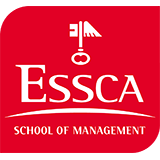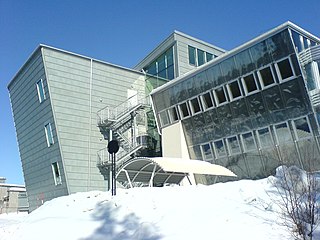Related Research Articles

Postgraduate or graduate education refers to academic or professional degrees, certificates, diplomas, or other qualifications pursued by post-secondary students who have earned an undergraduate (bachelor's) degree.
Tampere University of Technology (TUT) was Finland's second-largest university in engineering sciences. The university was located in Hervanta, a suburb of Tampere. It was merged with the University of Tampere to create the new Tampere University on 1 January 2019.
The University of Tampere (UTA) was a public university in Tampere, Finland that was merged with Tampere University of Technology to create the new Tampere University on 1 January 2019.
The Norwegian School of Economics or NHH is a business school situated in Bergen, Norway. It was founded in 1936 as Norway's first business school and is a leading teaching and research institution in the fields of economics and business administration.

The International Institute of Social Studies (ISS) of Erasmus University Rotterdam is an independent and international graduate school of policy-oriented critical social science. ISS was established in 1952 by Dutch universities and the Netherlands Ministry of Education. The institution is located in Netherlands, The Hague, also known as 'The World's Legal Capital'.

EURECOM is a French Graduate school and a research center in digital sciences. It is part of the Institut Mines-Télécom and it is a founding member of the SophiaTech Campus in Sophia Antipolis, the largest Science and Technology Information campus in the Alpes-Maritimes. It was created in 1991 as a Groupement d'intérêt économique with French and foreign academic and industrial members. The Institut Mines-Télécom is a founding member of EURECOM consortium. Current members of the consortium are listed below:
The European Union's Erasmus Mundus programme aims to enhance quality in higher education through scholarships and academic co-operation between the EU and the rest of the world. The three main objectives of the programme are linked to the internationalisation of students, staff, curricula and research; ensure an influence on the development of practice in Special Education Needs and inclusive education; and to develop international collaborative networks, projects and research.
VIBOT is an abbreviation of VIsion and RoBOTics. It is a 2-year European Masters in Computer Vision and Robotics course, conducted by Heriot-Watt University in Edinburgh, Scotland, Universitat de Girona in Girona, Spain and Université de Bourgogne in Le Creusot, France. It started in 2006 as part of the European Commission's Erasmus Mundus programme.
University Mobility in Asia and the Pacific (UMAP) is a voluntary regional association of government, non-government and/or university representatives of the higher education sector established in 1993 to enhance cooperation and exchange of people and expertise through increased mobility of higher education students and staff. UMAP has been endorsed by Asia-Pacific Economic Cooperation and member countries are implementing UMAP projects.
The European Master on Software Engineering, or European Masters Programme in Software Engineering (EMSE) is a two-year joint Master of Science (Msc) program coordinated by four European universities, funded by the Erasmus+ Programme of the European Union.
The European Master in Law & Economics, also known as EMLE, is an Erasmus Mundus post-graduate master's degree. It focuses on "interdisciplinary studies of law and economics" and "an advanced understanding of the economic effects of divergent laws".

Astromundus was a 2-years Erasmus Mundus masters course in Astronomy and Astrophysics. It was offered by a consortium of 5 partner universities of four different European countries. Partner universities were University of Innsbruck in Austria, University of Padova and University of Rome Tor Vergata in Italy, University of Göttingen in Germany and University of Belgrade in Serbia. Belgrade was a third country partner of this consortium.
The MAsters on Photonic NETworks engineering (MAPNET) is a European Union's Erasmus Mundus Master's Programme.

The Institut Barcelona d'Estudis Internacionals (IBEI) is an interuniversity research institute and postgraduate education center located in Barcelona, established in 2004 as a joint initiative between the Barcelona Centre for International Affairs and five universities in the Barcelona metropolitan area, as a center of excellence in international studies. The President of the Institute is Narcís Serra, former Minister of Defense and former Vice President of Spain, and the Director is Jacint Jordana, Professor of Political Science at the Pompeu Fabra University.

ESSCA School of Management is a French grande école and business school. Historically based in Angers, it now has campuses in Paris, Aix-en-Provence, Lyon, Bordeaux, Cholet, Budapest and Shanghai.

The Faculty of Social Sciences (FSS) is one of the newest faculties of Charles University. The Faculty was founded in 1990, shortly after the Velvet Revolution. It soon became a regional centre of teaching and research in area studies, economics, international relations, journalism, media studies, sociology and political science. The Faculty offers bachelor’s, master’s, and doctoral degree programs in social sciences. While the languages of instruction are Czech and English, students can choose from classes in a wide range of other languages, including French, German, Russian and Spanish.

The Joint European Master in Space Science and Technology is an Erasmus Mundus 120 ECTS master programme. The SpaceMaster programme started in 2005 and it is focused on providing education in Space Science and Technology to its students.

HSBA Hamburg School of Business Administration is a private business school located in Hamburg, Germany. Founded by Hamburg Chamber of Commerce in 2004, HSBA now cooperates with more than 300 companies. As a state-recognised third-level institution, it offers bachelor’s and master’s degrees in business as cooperative education and part-time courses for 1000 students. HSBA's Cooperative Education Model has its origin in Germany's dual education system which was applied to university level.
The European Joint Master degree in Economics provides a rigorous education in fundamental quantitative tools by combining economic theory with related quantitative disciplines such as Econometrics, Finance, Actuarial Science, Probability, Statistics, Mathematical Modeling, Computation and Simulation, Experimental Design, and Political Science, managed by consortia of higher education institutions from the European Union.
References
- ↑ "EUROPA - Education and Training - Erasmus Mundus : list of selected projects 2004". ec.europa.eu. Archived from the original on 25 May 2006.